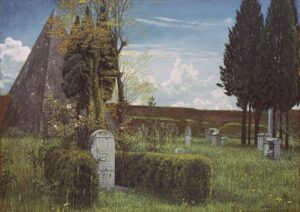The international conventions regularly offer researchers and students the possibility to study subjects which no other place like Rome is qualified to offer.
INTERNATIONAL CONFERENCE IN ROME – 17 – 19 November 2022
Roma (a)cattolica – Pluralisation of Religion in Rome between the End of the Papal State and the Beginning of Fascism (1870-1922)
20221117-19_Programme Roma Religione WEB
17 November (beginning 14.30h) to 19 November 2022 (optional service on Sunday, 20 November)
Topic
Rome is a religiously plural city. On the one hand, this is a banality: it applies to all major European cities. On the other hand, it is not self-evident, because Rome became a plural city relatively late and in a relatively short time. In fact, the perception of the city is often more characterised by Catholicism and secularism than by religious pluralism.
One can state quite precisely when this pluralism emerged: in the half century between the end of the Papal State and the beginning of fascism (1870-1922). A clear sign are the buildings being constructed at that time: A synagogue and several Anglican, Waldensian, Methodist, Lutheran, Reformed and Baptist churches as well as a cemetery for “non-Catholics” were built in the space of a few decades. The conference seeks to address this phenomenon from a comparative and transnational perspective. The transnational aspect is so important because for many religious communities, integration into the urban society was accompanied by new processes of negotiating confessional and national identities. The historiography to date is characterised by perspectives from within the particular congregations and denominational identity (parish anniversaries, etc.). A comparative view, on the other hand, can bring to light the structural implications for the city’s society, which was catapulted into the 20th century as if in fast motion.
It is fortunate that two anniversaries are coming up in 2022: 100 years of the Lutheran Church in Via Sicilia and 100 years of the Waldensian Faculty in Rome. They are more the occasion than the content of the conference. The criterion for the selection of speakers should not be their own Weltanschauung or religious identity (emic or etic perspective), but their willingness to engage academically with the topic.
Organiser
German Historical Institute Rome (DHI), Centro Melantone (Institute for Ecumenical Studies of the Waldesian Faculty of Theology and the Evangelical Lutheran Church in Italy), Anglican Centre
responsible: Professors Martin Baumeister (DHI, director), Mark Chapman (Oxford), Daniele Garrone (FVT, president of Centro Melantone), Martin Wallraff (LMU München)
Events held so far have been in regard to:
- Images of Rome in German Protestantism. Encounters with the city throughout the 19th century. A convention of the German Historical Institute and Melantone Center (2009)
- Catholicism, 50 years after the Second Vatican Council (2010)
- Martin Luther in Rome, a view of the cosmopolitan center. A convention of the German Historical Institute and Centro Melantone (2011)
- Cult of the Folk. Organised from the Roman Foundation of Görres and the University of applied sciences of diaconia in convention with the Liturgical EKD-Conference and Centro Melantone (2021)

